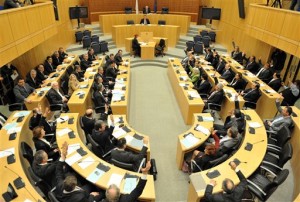Angry Cyprus MPs rail against EU ‘blackmail’

Members of parliament vote against a crucial plan to seize a part of depositors’ bank savings, in Nicosia, Tuesday, March 19, 2013. Cypriot lawmakers on Tuesday rejected a critical draft bill that would have seized part of people’s bank deposits in order to qualify for a vital international bailout, with not a single vote in favor. AP PHOTO/PHILIPPOS CHRISTOU
NICOSIA—Furious MPs took turns in parliament Tuesday to rail against the harsh terms of a bailout aimed at saving Cyprus from bankruptcy, decrying the eurozone “blackmail” as the deal hammered out at the weekend appeared to be unraveling.
Outside parliament equally angry crowds called for a “No” vote and held up signs warning that other financially crippled European nations like Italy and Spain could be next.
It was unclear if a vote on the measure would go ahead, however, after the ruling Disy party of President Nicos Anastasiades said it would abstain, and Sigma private television reported all other parties would also not take part.
The emergency session of parliament came soon after International Monetary Fund chief Christine Lagarde urged Cyprus to meet its commitments under the 10-billion-euro ($13 billion) deal sealed with eurozone partners on Saturday.
“It’s time to deliver,” Lagarde told a financial congress in Frankfurt.
Article continues after this advertisementBut parliamentary speaker Yiannakis Omirou, of the socialist Edek party, told deputies, “There can only be one answer: no to blackmail.”
Article continues after this advertisement“Our demand must be that this deal must be renegotiated. If we pass this tax there will be no foreign investor who will keep their money here,” he warned.
Under the deal, a controversial levy of at least 6.75 percent was to be slapped on all bank deposits across the island.
But the parliamentary finance committee, in a bid to make the package more palatable, Tuesday dropped the tax on bank savings below 20,000 euros, while retaining at 6.75 percent the levy on deposits of 20,000-100,000 euros and at 9.9 percent for amounts above 100,000 euros.
The changes prompted a warning by Central Bank governor Panicos Demetriades that the bailout deal could collapse as it will now no longer “yield the estimated 5.8 billion euros agreed by the eurogroup.”
“If we secure 5.5 billion it will be considered in breach of the agreement and perhaps will not be accepted,” Demetriades told the finance committee, as cited by the Cyprus News Agency.
Conservative President Anastasiades was hoping to push for a vote during an emergency parliamentary session on Sunday but faced with fury at home the vote was pushed to Monday and then rescheduled for Tuesday.
With no end in sight to the crisis, Europe’s main stock markets suffered further losses and the euro slid on Tuesday.
London’s FTSE 100 index of leading companies dipped 0.26 percent, while in Frankfurt the DAX 30 shed 0.79 percent.
In foreign exchange activity, the European single currency slid to $1.2873, from $1.2957 in New York late on Monday, to hit its lowest level since November 22.
The president had even before the session began called an emergency meeting of party leaders for Wednesday morning to “examine alternative plans to address the situation that may arise following developments determined by the parliamentary vote”.
Fearing a run on accounts, Cyprus has shut its banks until at least Thursday, with the local stock exchange closed for the same period.
A government spokesman said Anastasiades would have further telephone discussions on the terms of the bailout with German Chancellor Angela Merkel later Tuesday, after a first round of talks on Monday.
As the island leaders raced to stave off bankruptcy, Finance Minister Michalis Sarris was on his way to Moscow to seek an extension to an existing Russian loan.
Finance ministry director Andreas Charalambous told reporters that securing an extension to the loan was “very important” as it would throw Cyprus a lifeline.
“The first issue is we have a large loan maturing in 2016 and if we manage to come to an understanding this will help facilitate our debt repayments and debt sustainability,” Charalambous said.
“If we manage to extend the loan the refinancing needs of the economy would be manageable. So it’s very important.”
“There are other options the minister is going to discuss with the Russian government and investors as our ambitions are going beyond the extension of the loan. We will see if there is potential interest for further investment,” Charalambous added without elaborating.
Moscow extended Nicosia a 2.5-billion-euro loan in 2011 at a rate of 4.5 percent.
Sarris’s goal was to lower that rate and extend the loan’s expiration date until 2020 from 2016, reports said.
But talks were likely to be awkward given the levy demanded by the EU—Russians have billions of euros deposited in the island’s banks.
Estimates vary but the Moody’s rating firm estimates that Russian companies and banks keep up to $31 billion in Cyprus, which accounts for between a third and half of all Cypriot deposits.—Charlie Charalambous